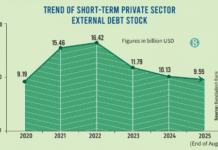Growing non-performing loans apparently challenge the banking sector’s stability by raising the cost of capital for the private sector and limiting credit flows to industries and SMEs, said a business leader.
Osama Taseer, president of the Dhaka Chamber of Commerce and Industry (DCCI), made the remarks while speaking at a dialogue titled “Monetary Policy Statement: Implication on Private Sector” at the DCCI auditorium on Saturday. The chamber organised the discussion.
“The NPL is coming down,” said Fazle Kabir, governor of Bangladesh Bank, in response. He said it came down 10.29 percent as of November 15, 2018, according to a statement of the DCCI yesterday.
The NPLs accounted for 11.45 percent of the total outstanding loan as of September 2018. Kabir urged banks to be watchful of credit quality and monitor to see whether loans are being utilised properly.
Mahmood Osman Imam, a professor of finance at the University of Dhaka, said good borrowers were suffering because of the increase in NPLs.
Taseer listed other challenges facing the economy, saying capital flight, weak exchange rate, unstructured capital market, slimming foreign direct investment inflow, unemployment, negative trade balance, and a lack of export diversification may hold back the desired private sector growth and economic mobility.
He said the recent Monetary Policy Statement (MPS) of the central bank looks cautionary.
However, its salient features may enrich the private sector credit flow and boost industrialisation and job creation, resulting in expected GDP growth in the current fiscal year, he said.
The features include unchanged advance-deposit and cash reserve ratios, 6 percent repurchase agreement (repo), 4.75 percent reverse repo, 16.50 percent private sector credit growth, 10.9 percent public sector credit growth, and 15.90 percent domestic credit growth targets.
The governor said as the private sector was the engine of economic growth, the central bank always focuses on increasing private sector credit growth.
“The MPS is aligned with the Sustainable Development Goals agenda,” he said, adding that the BB was always supportive of the country’s creative entrepreneurs and micro, small and medium enterprises.
On the higher rate of interest on national savings certificates, Kabir said the tool was designed for small investors as part of the social safety net and was a pension fund for the private sector undertaken directly by the government.
Waqar Ahmad Choudhury, senior vice-president of the chamber, while presenting his keynote paper, said the MPS was considered as a catalyst for private sector growth.
The MPS has focused on 7.8 percent GDP growth, targeted to keep inflation under 5.6 percent, encouraged bond market development, and set private sector credit growth target at 16.5 percent.
All of these are positive for attracting private sector investment, Choudhury said.
He also said the rise in non-food inflation and purchasing power may push inflation to 6 percent. The public sector credit growth reached 13.30 percent from a negative 2.50 percent.
“This growth trend may shrink the space of desired growth of the private sector credit.”
MA Baqui Khalili, a former professor of finance at the University of Dhaka, said the BB should carry out a study on the monetary policy’s impact.
Source: The Daily Star










